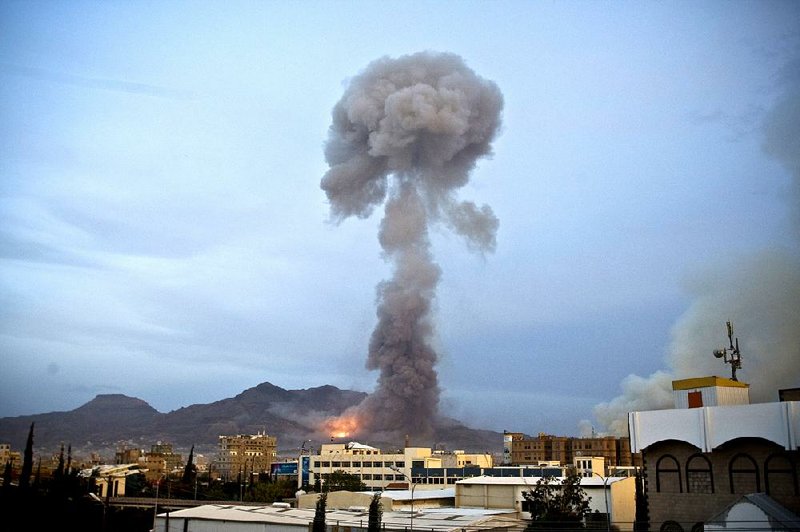SANAA, Yemen -- Shiite rebels in Yemen claimed Monday to have shot down a Moroccan F-16 fighter jet taking part in a Saudi-led coalition targeting them and their allies, just a day before a five-day humanitarian cease-fire was set to begin and as coalition airstrikes intensified in the capital, Sanaa.
Morocco's military would only say that the jet had vanished early Sunday evening, but a Moroccan online news site with close ties to the kingdom's royal palace and security and intelligence services said the downed aircraft was one of two that flew out of a base in the United Arab Emirates on Sunday on a reconnaissance mission over the Yemeni side of the border with Saudi Arabia.
The French-language site, Le360, said rebel anti-aircraft batteries stationed atop mountains standing 5,900 feet high opened fire on the two aircraft as they flew overhead at low altitude.
"The Moroccan fighter jets maneuvered, gained altitude, attempted to escape the danger, but it was too late. One of the craft was hit and went into a spin," said Le360.
The purported downing of the jet fighter came as a Saudi-owned news channel, al-Hadath, aired live footage of tanks and armored personnel carriers loaded onto trucks, saying they were part of a "strike force" deploying to the kingdom's border with Yemen. There have been no signs to suggest that a ground offensive is imminent, although the coalition has not ruled one out.
Yemeni security officials, meanwhile, said Sanaa came under heavy air bombardment Monday afternoon, with the primary target being weapons and ammunition depots on Noqom Mountain on the city's northeastern outskirts. The bombing unleashed a series of explosions, with shells flying out, hitting residential areas and starting fires. There was no immediate word on civilian casualties.
The officials, who spoke on condition of anonymity, said Monday's explosions were the strongest in the capital since the air campaign began, causing some homes to collapse.
A video clip posted on social media purported to show a reporter from the rebels' mouthpiece television station al-Maseera visiting the site of the Moroccan jet's crash in the northern Saada province, birthplace and stronghold of the rebel movement known as Houthis.
The rebels and their allies in Yemen's splintered armed forces have routinely fired anti-aircraft rounds at warplanes launching strikes in the country since the Saudi-led campaign began March 26.
Morocco's state news agency MAP, citing a military statement, said the pilot of a second jet said he didn't see the pilot of the missing fighter eject. The military said it had begun an investigation, without elaborating on a cause for the crash.
Morocco has six F-16 jets stationed in the United Arab Emirates taking part in the Saudi-led coalition, which includes a group of other Sunni Arab countries. The West says regional Shiite power Iran backs the Houthis militarily, something both the Islamic Republic and the rebels deny.
Iran's semi-official Fars news agency reported Monday that a cargo ship carrying 2,500 tons of food, medicine, tents and blankets departed Monday afternoon from the Iranian port of Bandar Abbas, heading for the Yemeni port of Hodeida.
The conflict in Yemen has killed over 1,400 people -- many of them civilians -- since March 19, according to the United Nations. The cease-fire, scheduled to begin at 11 p.m. local time Tuesday, would help ease the suffering of civilians in the Arab world's poorest country, who have endured shortages of power, water, food and medicine as a result of a Saudi-led naval, air and land blockade.
On Monday, Human Rights Watch said the blockade is keeping out fuel needed for the survival of the Yemeni population.
Yemen, it said, urgently needs fuel to power generators for hospitals overwhelmed with wounded people and to pump drinking water. The coalition, it added, must urgently "implement measures for the rapid processing of oil tankers to allow the safe, secure, and speedy distribution of fuel supplies to the civilian population."
Meanwhile, the extremist Islamic State group's branch in Yemen released a video purportedly showing the killing of at least 11 Yemeni army soldiers in the southern province of Shabwa. While it could not be independently verified, the video corresponded to others released by the extremists.
In Malaysia, the army issued a statement Monday saying it wasn't sending ground troops to support the Saudi-led coalition. On Sunday, the state-run Saudi Press Agency reported that a contingent of Malaysian troops arrived at Saudi air bases.
The Malaysian military said it based two C-130 transport planes in the kingdom only to "facilitate the safe and smooth evacuation of the remaining Malaysian citizens in Yemen."
Information for this article was contributed by Nasser Karimi of The Associated Press.
A Section on 05/12/2015

